This is a list of current
United States Marine Corps
The United States Marine Corps (USMC), also referred to as the United States Marines, is the maritime land force service branch of the United States Armed Forces responsible for conducting expeditionary and amphibious operations through combi ...
battalion
A battalion is a military unit, typically consisting of 300 to 1,200 soldiers commanded by a lieutenant colonel, and subdivided into a number of companies (usually each commanded by a major or a captain). In some countries, battalions a ...
s, sorted by the mission they perform.
__TOC__
Active units
Ground Combat Element battalions
The ground combat element (GCE) consists of those combat and combat support units whose primary mission is to, (1) engage with and destroy the enemy by fire and/or maneuver, and/or shock effect, performed by infantry, field artillery, and tank units, (2) provide close battlefield support to other GCE units by assault amphibian, combat assault, light armored reconnaissance, reconnaissance, and combat engineer units, or (3) provide immediate command and control, and limited logistical support including consolidated Navy personnel administration and motor transport (medium truck) support to subordinate GCE battalions and regiments (infantry and artillery only) by Marine division (MARDIV) headquarters battalions. Additionally, this battalion provides communications networking and law enforcement support across the GCE. The headquarters battalion also includes the division band, whose tactical mission is to serve as a provisional rifle platoon in providing division headquarters security.
Note: Some GCE battalions and regiments are provided air liaison officers/forward air controllers (i.e., Marine Corps naval aviators — aircraft pilots, and naval flight officers — airborne weapons and sensor systems officers) with specialized skills in coordinating air support of ground units) from the Marine Aircraft Wing (MAW) of the aviation combat element (ACE). These officers facilitate employment of Marine aviation in support of GCE units to perform offensive air support (e.g., close air support), assault support (e.g., troop, cargo, and casualty transport, aerial command and control, liaison, communications, and illumination, and close-in fire support by light/attack helicopters), and aerial reconnaissance (e.g., tactical reconnaissance and artillery spotting).
Infantry battalions
Infantry battalions are the heart and soul of the
ground combat element. The mission of locating, closing with, and destroying the enemy with fire and maneuver and repelling the enemy's assault with fire and close combat lies with the "
grunts".
Marine infantry battalions often have limited organic equipment outside of small arms, infantry crew-served weapons (e.g., heavy machine guns, medium mortars, and anti-tank missiles), and a few light tactical trucks. Marine infantry primarily maneuvers by foot as
light infantry
Light infantry refers to certain types of lightly equipped infantry throughout history. They have a more mobile or fluid function than other types of infantry, such as heavy infantry or line infantry. Historically, light infantry often fought ...
, and must be supplemented with additional
trucks
A truck or lorry is a motor vehicle designed to transport cargo, carry specialized payloads, or perform other utilitarian work. Trucks vary greatly in size, power, and configuration, but the vast majority feature body-on-frame construction ...
to become
motorized infantry
Motorized infantry is infantry that is transported by trucks or other motor vehicles. It is distinguished from mechanized infantry, which is carried in armoured personnel carriers or infantry fighting vehicles, and from light infantry, which ca ...
or
Amphibious Assault Vehicle
The Assault Amphibious Vehicle (AAV)—official designation AAVP-7A1 (formerly known as Landing Vehicle, Tracked, Personnel-7 abbr. LVTP-7)—is a fully tracked amphibious landing vehicle manufactured by U.S. Combat Systems (previously by Unit ...
s to become
mechanized infantry
Mechanized infantry are infantry units equipped with armored personnel carriers (APCs) or infantry fighting vehicles (IFVs) for transport and combat (see also mechanized force).
As defined by the United States Army, mechanized infantry is di ...
.
A Marine infantry battalion is usually organized into three
rifle companies, a
weapons company, and a
headquarters and service company. The rifle company has a company
headquarters, three rifle
platoons
A platoon is a military unit typically composed of two or more squads, sections, or patrols. Platoon organization varies depending on the country and the branch, but a platoon can be composed of 50 people, although specific platoons may range f ...
, with three rifle
squads each, and a weapons platoon with
medium machineguns,
mortars, and
assault weapons
A weapon, arm or armament is any implement or device that can be used to deter, threaten, inflict physical damage, harm, or kill. Weapons are used to increase the efficacy and efficiency of activities such as hunting, crime, law enforcement, s ...
sections. The weapons company includes a company headquarters, a
heavy
Heavy may refer to:
Measures
* Heavy (aeronautics), a term used by pilots and air traffic controllers to refer to aircraft capable of 300,000 lbs or more takeoff weight
* Heavy, a characterization of objects with substantial weight
* Heavy, ...
machinegun
A machine gun is a fully automatic, rifled autoloading firearm designed for sustained direct fire with rifle cartridges. Other automatic firearms such as automatic shotguns and automatic rifles (including assault rifles and battle rifles) ar ...
platoon, an
81mm mortar platoon, and an
antiarmor
Armour (British English) or armor (American English; see spelling differences) is a covering used to protect an object, individual, or vehicle from physical injury or damage, especially direct contact weapons or projectiles during combat, or f ...
platoon. Sometimes, the commander will mix these into
Combined Anti-Armor Team
A Combined Anti-Armor Team or Combined Arms Assault Teams, (CAAT) is an organization of a United States Marine Corps weapons company where one or more platoons are operated in a detached role to conduct reconnaissance missions, combat ground armore ...
s. The headquarters and service company includes all
command
Command may refer to:
Computing
* Command (computing), a statement in a computer language
* COMMAND.COM, the default operating system shell and command-line interpreter for DOS
* Command key, a modifier key on Apple Macintosh computer keyboards
* ...
,
administration
Administration may refer to:
Management of organizations
* Management, the act of directing people towards accomplishing a goal
** Administrative Assistant, traditionally known as a Secretary, or also known as an administrative officer, admini ...
,
intelligence
Intelligence has been defined in many ways: the capacity for abstraction, logic, understanding, self-awareness, learning, emotional knowledge, reasoning, planning, creativity, critical thinking, and problem-solving. More generally, it can be des ...
,
operations,
logistics
Logistics is generally the detailed organization and implementation of a complex operation. In a general business sense, logistics manages the flow of goods between the point of origin and the point of consumption to meet the requirements of ...
, and
communication
Communication (from la, communicare, meaning "to share" or "to be in relation with") is usually defined as the transmission of information. The term may also refer to the message communicated through such transmissions or the field of inqui ...
Marines and equipment, as well as the battalion's
Scout Sniper
United States Marine Corps Scout Sniper (MOS 0317, formerly 8541) is a secondary MOS (Military Occupational Specialty) designator of U.S. Marine Corps infantrymen and reconnaissance Marines that have graduated from a U.S. Marine Corps Scout Snipe ...
platoon and Battalion Aid Station (BAS) staffed by U.S. Navy
Hospital Corpsman
A hospital corpsman (HM r corpsman is an enlisted medical specialist of the United States Navy, who may also serve in a U.S. Marine Corps unit. The corresponding rating within the United States Coast Guard is health services technician (HS ...
. By 2030 three battalions will be disbanded, and some reflagged: 1/8th becoming 2/2nd, 2/8th becoming 4/6th, 8th Marine HQ and 3rd Btn disband.
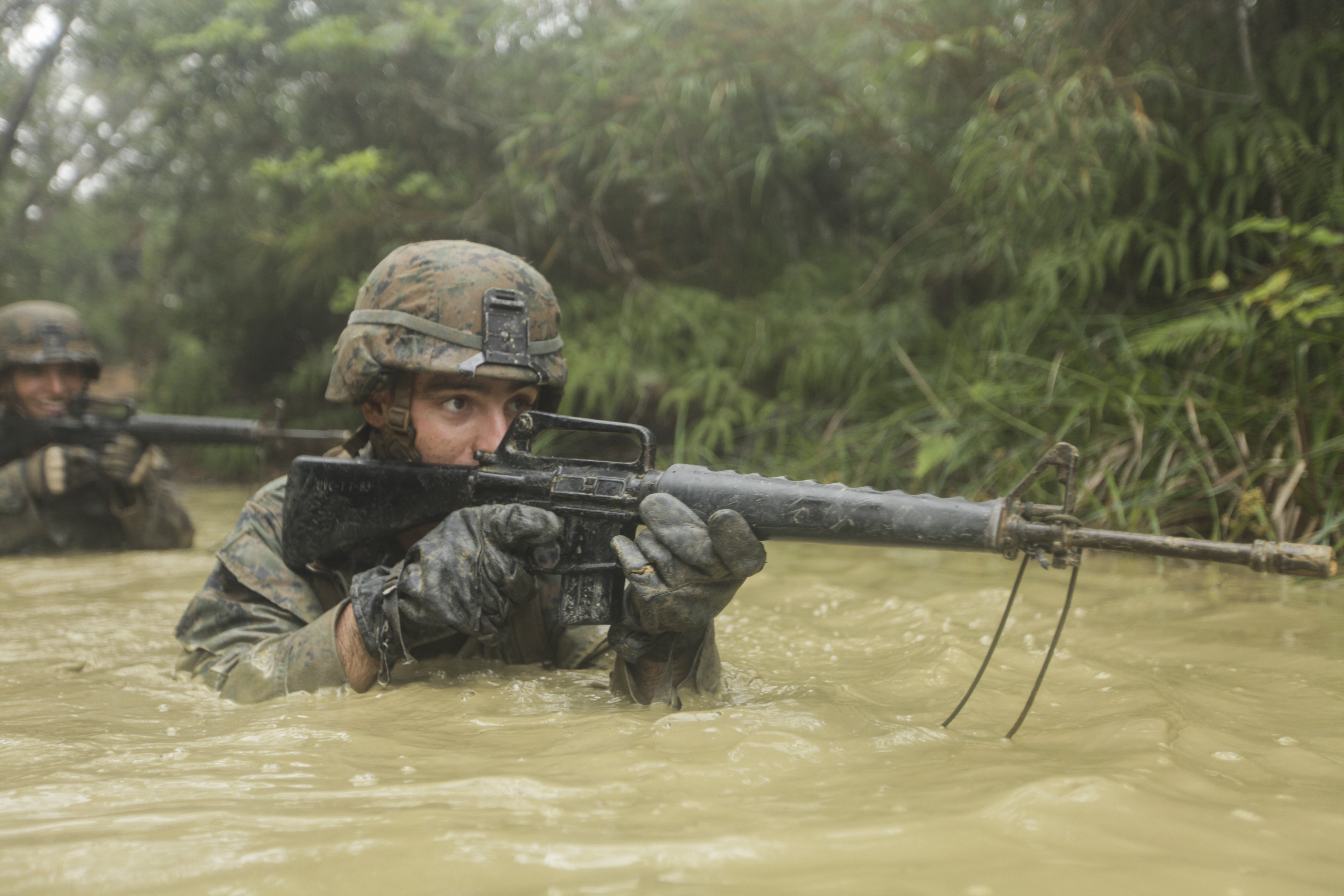
Artillery battalions
Field artillery units provide indirect, long-range cannon and rocket fire support for the
Marine Air-Ground Task Force.
Currently, artillery regiments contain two or three (11th Marines only) cannon battalions and are equipped with the
M777 lightweight, towed, 155 mm, medium howitzer and the
Expeditionary Fire Support System (EFSS) 120 mm, heavy mortar. Two regiments (11th Marines and 14th Marines) also have one rocket battalion equipped with the
M142 High Mobility Artillery Rocket System (HIMARS) equipped with the
MGM-140 ATACMS surface-to-surface, guided missile.
Marine artillery battalions contain a
Headquarters Battery
In United States Army units, a Headquarters and Headquarters Company (HHC) is a company (military unit), company-sized military unit, found at the battalion level and higher. Considered one unit, a Headquarters and Headquarters Company is essent ...
and three or four firing
batteries.
Firing batteries contain a headquarters platoon (including a liaison section with three
forward observer teams) and one or two firing platoons (depending upon weapons systems). The firing platoon(s) contain a battery operations center, a
fire direction center
In the US system for land-based field artillery, the field artillery team is organized to direct and control indirect artillery fire on the battlefield.
Since World War I, to conduct indirect artillery fire, three distinct components have evolv ...
, and four or six artillery sections (depending upon weapon system).
Counter-battery radar
A counter-battery radar (alternatively weapon tracking radar or COBRA) is a radar system that detects artillery projectiles fired by one or more guns, howitzers, mortars or rocket launchers and, from their trajectories, locates the position on ...
is usually a regimental asset, but can be detached to augment battalions or batteries. By 2030 all but five artillery batteries will be disbanded.

Armor battalions
The mission of an
armor
Armour (British English) or armor (American English; see spelling differences) is a covering used to protect an object, individual, or vehicle from physical injury or damage, especially direct contact weapons or projectiles during combat, or f ...
unit is to conduct and support
amphibious operations
Amphibious warfare is a type of offensive military operation that today uses naval ships to project ground and air power onto a hostile or potentially hostile shore at a designated landing beach. Through history the operations were conducte ...
and other operations as required by landing and transporting to inland objectives the surface
assault elements and their equipment, and by conducting light armored
reconnaissance
In military operations, reconnaissance or scouting is the exploration of an area by military forces to obtain information about enemy forces, terrain, and other activities.
Examples of reconnaissance include patrolling by troops (skirmisher ...
and limited offensive and defensive operations. When task-organized with infantry, tanks, and other forces, the battalion conducts combined arms operations as a separate maneuver element in support of the
Marine Division.
Currently, Assault Amphibian (AA) battalions utilize the
Amphibious Assault Vehicle
The Assault Amphibious Vehicle (AAV)—official designation AAVP-7A1 (formerly known as Landing Vehicle, Tracked, Personnel-7 abbr. LVTP-7)—is a fully tracked amphibious landing vehicle manufactured by U.S. Combat Systems (previously by Unit ...
(AAVP-7A1) and consist of a headquarters and service company and two to six AA companies. Each AA company is equipped with 42 AAVs (including personnel, command, and recovery variants) organized into three platoons of 12 AAVs each and an additional six AAVs in the company headquarters. Each AA platoon is capable of transporting an entire Marine rifle company plus any dismounted attachments (e.g., mortar forward observer teams, anti-tank missile crews, scout/sniper or reconnaissance squads) thus transforming into amphibious/mechanized infantry. (One AA company is capable of transporting the assault echelon of a Marine infantry battalion.) Although plans were in place to replace it with the
Expeditionary Fighting Vehicle
The Expeditionary Fighting Vehicle (EFV) (formerly known as the Advanced Amphibious Assault Vehicle (AAAV)) was an amphibious assault vehicle developed by General Dynamics during the 1990s and 2000s for use by the U.S. Marine Corps. It would ...
, the cancellation of the program is going to prolong use of the AAV.
Light Armored Reconnaissance
The United States Marine Corps Light Armored Reconnaissance Battalions, or LAR Battalions, are fast and mobilized armored terrestrial reconnaissance units that conduct reconnaissance-in-force (RIF) ahead of the battalion landing teams or divisio ...
(LAR) battalions use the
LAV 25
The LAV-25 is a member of the LAV II family. It is an eight-wheeled amphibious armored reconnaissance vehicle built by General Dynamics Land Systems and used by the United States Marine Corps and the United States Army.
History
During the 1980s ...
series of vehicles and consist of a headquarters and service company and four LAR companies. Each LAR company is equipped with 25 LAVs (including 14 LAV-25, two mortar, four anti-tank, one command & control, three logistics, and one recovery variant).

Combat Engineer battalions
The mission of
combat engineers
A combat engineer (also called pioneer or sapper) is a type of soldier who performs military engineering tasks in support of land forces combat operations. Combat engineers perform a variety of military engineering, tunnel and mine warfare tas ...
is to provide mobility, counter mobility, survivability, and limited general engineering support.
Mobility includes the assessment and fortification of roadways and bridges, the clearing of enemy
obstacle
An obstacle (also called a barrier, impediment, or stumbling block) is an object, thing, action or situation that causes an obstruction. Different types of obstacles include physical, economic, biopsychosocial, cultural, political, technologic ...
s and
landmines, and assault
breaching. Counter mobility includes creating obstacles and barriers for the enemy, which could include the destruction of structures and/or bridges. Survivability includes the
fortification
A fortification is a military construction or building designed for the defense of territories in warfare, and is also used to establish rule in a region during peacetime. The term is derived from Latin ''fortis'' ("strong") and ''facere' ...
of positions and the construction of new outposts. Other jobs can include
Explosive Ordnance Disposal
Bomb disposal is an explosives engineering profession using the process by which hazardous explosive devices are rendered safe. ''Bomb disposal'' is an all-encompassing term to describe the separate, but interrelated functions in the milit ...
(EOD), construction, and utilities (such as generators and refrigeration).
Currently, combat engineers use a variety of tools for their trade. Some vehicles include the
M9 Armored Combat Earthmover,
D7 Bulldozer,
M60A1 Armored Vehicle Launched Bridge
The M60 Armored Vehicle Launched Bridge (AVLB) is an armored vehicle based on the M60 Patton main battle tank's hull and used for the launching and retrieval of a scissors-type bridge. The AVLB consists of three major sections: the launcher, the v ...
, and various
cranes and
forklifts. Each combat engineer battalion consists of a headquarters and service company, three combat engineer companies, one mobility assault company, and an engineer support company.
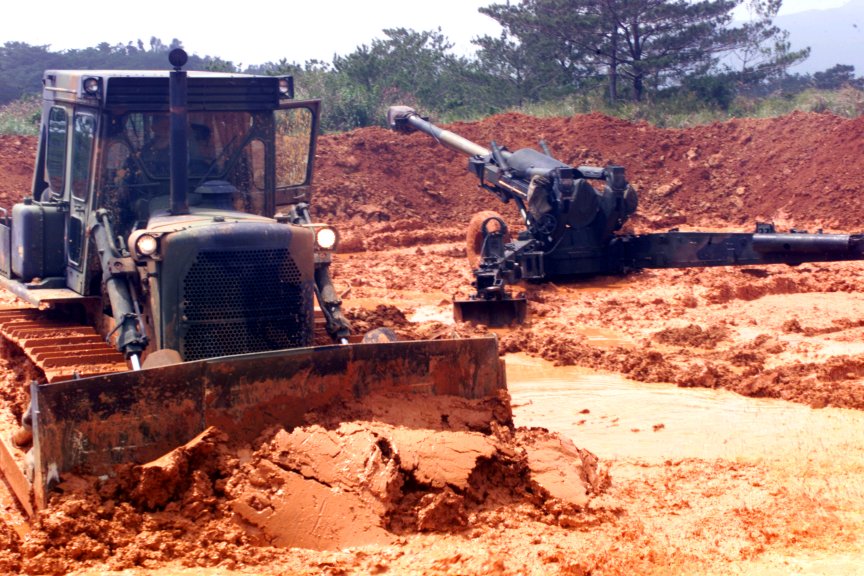
Reconnaissance battalions
The mission of the
reconnaissance battalions is to obtain information by visual observation about the activities and resources of an enemy or potential enemy, or about the meteorologic, hydrographic, or geographic characteristics of a particular area. They specialize in
amphibious recon, including
hydrography
Hydrography is the branch of applied sciences which deals with the measurement and description of the physical features of oceans, seas, coastal areas, lakes and rivers, as well as with the prediction of their change over time, for the primar ...
; as well as
airborne recon,
infiltration via surface, subsurface and airborne operations, and conducting limited scale raids and ambushes. The battalions consist of a headquarters and service company and one to four reconnaissance companies (divisional assets, individual companies usually attached to an RCT). All battalions (except 4th Recon) also have a force reconnaissance company dedicated to provide deep reconnaissance and direct action capability to a MEF HQ. (Two additional separate force reconnaissance companies exist in the Marine Forces Reserve.)
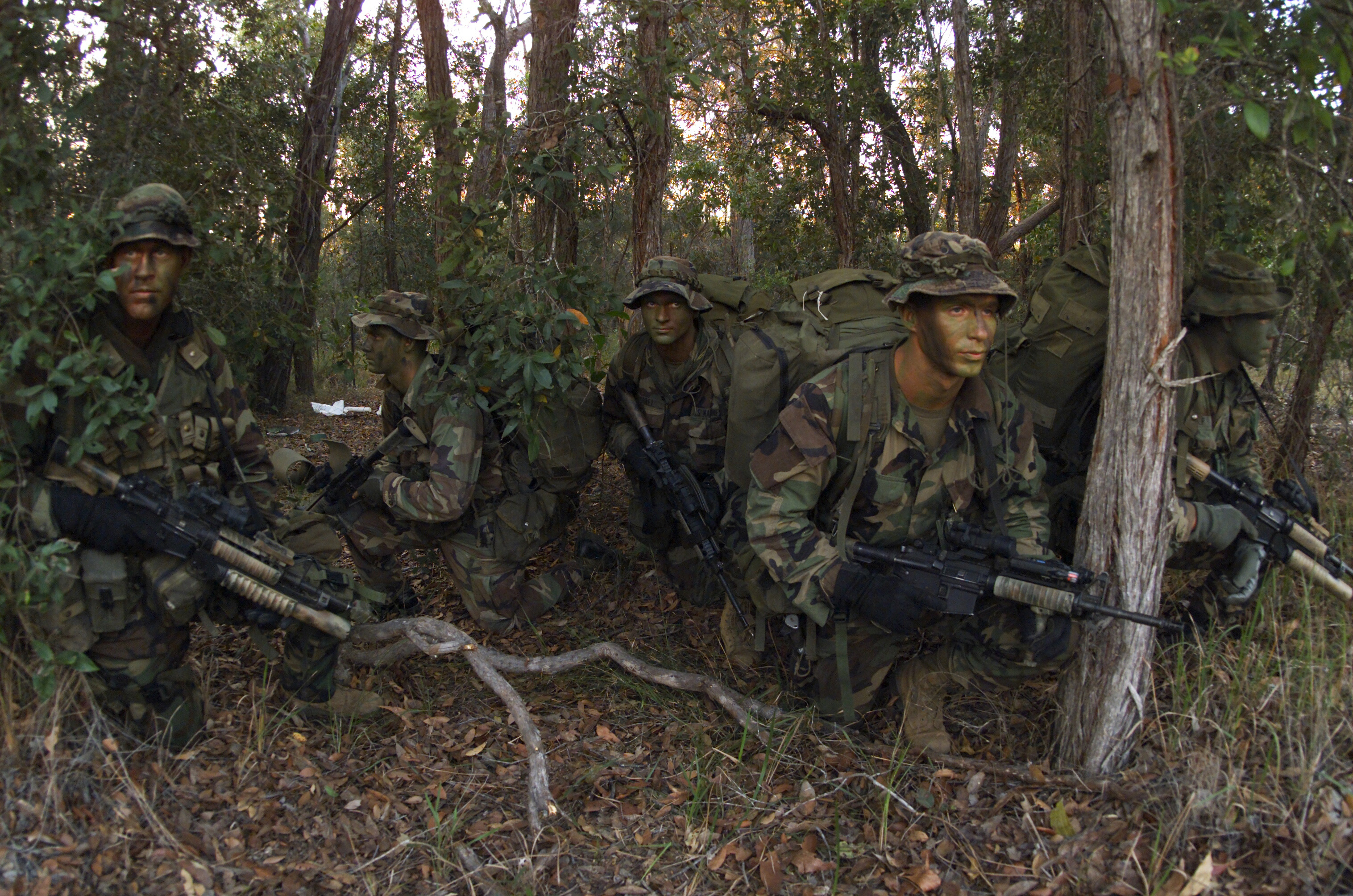
Headquarters battalions
Headquarters battalions provide the
command and control
Command and control (abbr. C2) is a "set of organizational and technical attributes and processes ... hatemploys human, physical, and information resources to solve problems and accomplish missions" to achieve the goals of an organization or en ...
, administration and logistics for a
Marine division. Each MARDIV HQBN is uniquely organized to support its division. However, typically the battalion is commanded by a colonel, and consists of headquarters company (including the division band), communications company, truck company (2 in HQBN FIRSTMARDIV), and may include a military police company.
Logistics Combat Element battalions
The logistics combat element (LCE) consists of those combat service support units whose primary mission is to, (1) provide direct combat logistics (i.e., motor transport and landing support, and limited engineer support, equipment maintenance, and ground supply services) to specified GCE units or certain aviation combat element (ACE) units as provided by combat logistics battalions and separate combat logistics companies, (2) provide general combat service support across the Marine Air Ground Task Force (MAGTF) by specialized service support battalions, including: dental, engineer support, maintenance, medical, supply and transportation support battalions, or (3) provide immediate command and control, and consolidated Navy personnel administration to subordinate LCE battalions and regiments by the Marine Logistics Group (MLG) headquarters and service battalion. Additionally, this battalion provides communications networking and law enforcement support across the LCE. The headquarters and service battalion also provides specialized services, including: military postal service, Marine Corps Exchange (MCX), and other personal services, to units of all four MAGTF elements (i.e., GCE, ACE, LCE, and CE).
Combat Logistics battalions
Combat logistics battalions (CLB) provide combat service support for the GCE and ACE beyond their organic capabilities. The battalions primarily provide motor transport and logistics control and materiel handling (i.e., landing support) services, and limited engineer, maintenance, and supply services, to dedicated Regimental Combat Teams (RCT) or Marine Expeditionary Units (MEU). CLBs that support RCTs typically consist of a headquarters and service company, and three support companies (engineer, maintenance, and transportation); those CLBs that support MEUs typically consist of several functional units (individual units may be styled as either a section, platoon, detachment, or company depending upon the size of unit, function, and the unit's parent battalion/regiment/group). In addition to a headquarters and service unit, these CLBs contain units dedicated to providing: air delivery, communications, engineer, explosive ordnance disposal, health services (medical and dental), landing support, law enforcement (military police), maintenance, motor transport, and supply support to the MEU.
Maintenance battalions
Maintenance battalions provide intermediate level (3d and 4th echelon) maintenance support for Marine Corps furnished (vice Navy, other service, or contractor provided) tactical ordnance (i.e., weapons and weapons systems), engineer, motor transport, communication-electronics, and general support (e.g., generators, refrigeration systems, water purification) equipment of the Marine Expeditionary Force (MEF). Maintenance battalions are usually organized with a headquarters and service company and five maintenance companies (electronic, engineer, general support, ordnance, and motor transport).
Engineer Support battalions
Engineer support battalions provide engineer support past the level available from organic engineers, such as combat bridging. ESBs also provide the storage and distribution of water and bulk fuels. Engineer support battalions usually consist of a headquarters and service company, three engineer companies, an engineer support company, a bridge company, a bulk fuel company, and an explosive ordnance disposal company.
Landing Support battalions
Landing support battalions support distributed maritime operations and expeditionary advanced base operations.
Supply battalions
Supply battalions provide
supply
Supply may refer to:
*The amount of a resource that is available
**Supply (economics), the amount of a product which is available to customers
**Materiel, the goods and equipment for a military unit to fulfill its mission
*Supply, as in confidenc ...
support past that of organic unit supply. They provide all assets that a Marine unit might need, excepting fuels, water, and aviation repair parts provided from the Navy. Rations, repair parts, ammunition, personal equipment, and even entire end items are all provided by or through the supply battalions. Supply battalions usually consist of a headquarters and service company, an ammunition company, a medical logistics company, and a supply company.

Transportation Support battalions
Transportation Support battalions provide the MEF with motor vehicle (truck) transportation and throughput support for the distribution of supplies, personnel, and equipment. The battalions consist of a headquarters and service company and three truck companies.
Medical battalions
Medical battalions provide medical care beyond the immediate care of unit
corpsmen
A hospital corpsman (HM r corpsman is an enlisted medical specialist of the United States Navy, who may also serve in a U.S. Marine Corps unit. The corresponding rating within the United States Coast Guard is health services technician (HS) ...
. Often, these units act as
field hospital
A field hospital is a temporary hospital or mobile medical unit that takes care of casualties on-site before they can be safely transported to more permanent facilities. This term was initially used in military medicine (such as the Mobile A ...
s when on deployment. In garrison, they supplement naval hospitals at various
Marine Corps installations. Medical battalions are manned by primarily by
Navy Medical Corps personnel and typically consist of a headquarters and service company and three surgical companies.
Dental battalions
Dental battalions are responsible for the oral health of Marines and Sailors within the MAGTF. On deployment, they can also be used to support
field hospital
A field hospital is a temporary hospital or mobile medical unit that takes care of casualties on-site before they can be safely transported to more permanent facilities. This term was initially used in military medicine (such as the Mobile A ...
s per Bureau of Medicine and Surgery Instruction, when not performing dental roles. In garrison, they run dental health clinics at various
Marine installations. Dental battalions are manned primarily by
Navy Dental Corps
The Dental Corps of the United States Navy consists of naval officers who have a doctorate in either dental surgery (DDS) or dental medicine (DMD) and who practice dentistry for Sailors and Marines to ensure optimal oral health.
The U.S. Navy De ...
personnel and usually consist of a headquarters and service company and three dental companies.
Headquarters and Support battalion
(The former H&S battalions of the 1st, 2nd, and 3rd MLGs—previously designated as Combat Logistics Regiments 17, 27, and 37, respectively—are now designated as
"Headquarters Regiments")
Headquarters and Service battalion provides command and control, administration, communications, security, food service and data processing support to the Marine Logistics Group (MLG) and supporting services to the Marine Expeditionary Force (MEF) or two Marine Expeditionary Brigades (MEB) and MEF residual forces in expeditionary/amphibious operations and subsequent operations ashore. Support includes data processing, financial disbursing, postal, legal, Marine Corps Exchange (MCX) and consolidated Navy personnel administration to the MLG. The battalion typically consists of headquarters company, communications company, military police company, and service company.
Command Element units
The command element (CE) consists of those command and control, communications, intelligence, law enforcement, electronic warfare/signals intelligence/electronic intelligence, civil affairs, air/naval gunfire liaison, and force reconnaissance units that enable the MAGTF commander to effectively fight the GCE and ACE, with support from the LCE, to defeat the enemy and/or accomplish other assigned missions.
Note: U.S. Marine Corps organizational doctrine places communications, intelligence, and law enforcement battalions and their organic companies/detachments in the MAGTF headquarters group or CE. However, intelligence (i.e., ground intelligence) may also be considered as a GCE function (primarily located in the infantry battalion scout/sniper platoon) and communications and law enforcement may also be considered as logistics functions. Most GCE battalions and regiments, and ACE squadrons/battalions (LAAD), Marine aircraft groups (MAGs), and Marine air control groups (MACGs), contain some organic communications assets such as battalion and regimental communications platoons, MARDIV and MLG communications companies, and Marine wing communications squadrons. In addition, MARDIVs, Marine Aircraft Wings (MAWs), and MLGs also possess a limited organic law enforcement capability.
Communications battalions
Communications battalions provide
communication
Communication (from la, communicare, meaning "to share" or "to be in relation with") is usually defined as the transmission of information. The term may also refer to the message communicated through such transmissions or the field of inqui ...
support for the MAGTF as part of the MEF headquarters groups. They also perform networking and data services when deployed. The battalions typically consist of a headquarters and service company, three communications companies, and a support (maintenance) company.
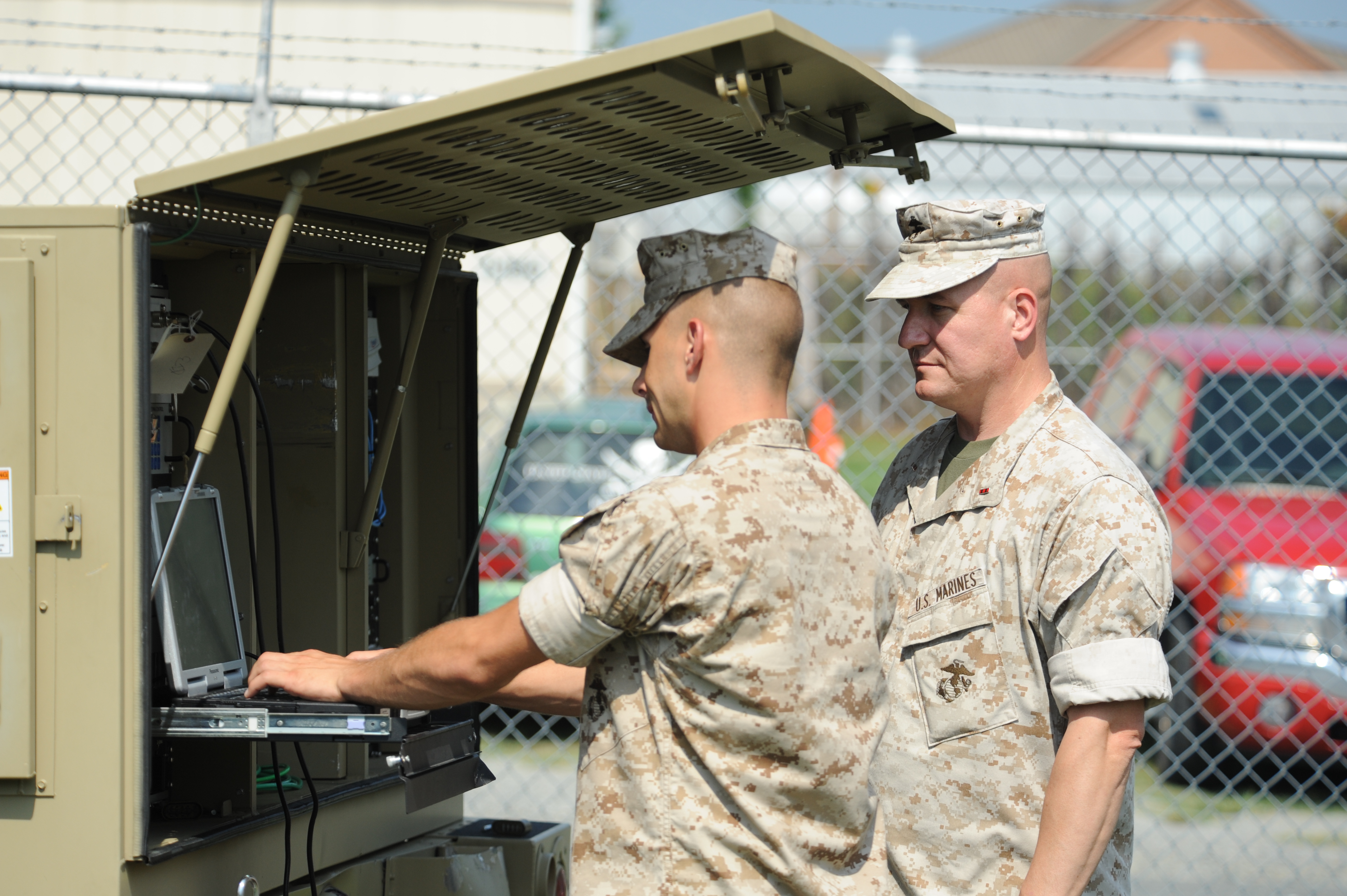
Intelligence battalions
Intelligence battalions, attached to MEF headquarters groups, are to plan and direct, collect, process, produce and disseminate
intelligence
Intelligence has been defined in many ways: the capacity for abstraction, logic, understanding, self-awareness, learning, emotional knowledge, reasoning, planning, creativity, critical thinking, and problem-solving. More generally, it can be des ...
, and provide
counterintelligence
Counterintelligence is an activity aimed at protecting an agency's intelligence program from an opposition's intelligence service. It includes gathering information and conducting activities to prevent espionage, sabotage, assassinations or ...
support. In addition to a headquarters and service company, the battalions consist of two to four military intelligence companies that perform battlefield surveillance, production and analysis, and counterintelligence/human intelligence.
Law Enforcement battalions

The LE battalions will be a force multiplier to the operating forces forward deployed by assisting in an array of missions from law enforcement, route regulation, humanitarian assistance, nonlethal weapons training, and military working dog employment. Marine Corps Bulletin 5400, released in September 2011, called for the reactivation of the 1st, 2nd, 3rd, and 4th Military Police Battalions, now designated as law enforcement battalions, in each Marine Expeditionary Force and Marine Forces Reserve. Three law enforcement battalions were activated in June 2012, with each battalion consisting of a headquarters and service company and two or more law enforcement companies. Each included "500 military police officers
'sic''and dozens of dogs."
(Note: As military units, each battalion contains only about 30 to 40 "officers," as the majority of the military police Marines are enlisted members and not officers. "Officers" as in any military organization, command the battalion and its organic companies and platoons and serve as staff officers in the battalion headquarters.)
By 2030 all of the battalions will be disbanded following the re-organisation announcement.
Radio battalions
Radio battalions provide the MEF with tactical
electronic warfare
Electronic warfare (EW) is any action involving the use of the electromagnetic spectrum (EM spectrum) or directed energy to control the spectrum, attack an enemy, or impede enemy assaults. The purpose of electronic warfare is to deny the opponen ...
, as well as
signals intelligence and
electronic intelligence
Signals intelligence (SIGINT) is intelligence-gathering by interception of '' signals'', whether communications between people (communications intelligence—abbreviated to COMINT) or from electronic signals not directly used in communication ...
. The battalions consist of a headquarters and service company and three operations companies.
Network Battalions
Marine Corps network battalions are responsible for providing all aspects of security, operations, and protection for
Department of Defense Department of Defence or Department of Defense may refer to:
Current departments of defence
* Department of Defence (Australia)
* Department of National Defence (Canada)
* Department of Defence (Ireland)
* Department of National Defense (Philipp ...
Information Networks from the enterprise at the service level, down to each individual warfighter.
Civil Affairs groups
Civil Affairs groups provide the capability to plan and execute civil military operations while serving as the liaison between military forces and civil authorities, the local population and non-governmental organizations. The groups conduct activities which enhance the relationship between the military and host nation personnel and organizations facilitated through application of civil affairs specialty skills in areas normally the responsibility of civil governments.
Other units
While these units are designated as companies, they are commanded by a Lt. Col. who is assisted by an executive officer and an executive staff (S-1, S-2, etc.). The company's organic platoons often operate independently and are normally commanded by a major (ANGLICO) or captain (FORECON).
Air Naval Gunfire Liaison companies (ANGLICO) provide Marine Air-Ground Task Force (MAGTF) commanders a liaison capability, with foreign area expertise, to plan, coordinate, and conduct terminal control of fires in support of joint, allied, and coalition forces. ANGLICO units are separate companies (i.e., not organic to a battalion or regiment) reporting directly to one of the three MEF HQ Groups (1st, 2nd, & 5th ANGLICO) or the Forces HQ Group, Marine Forces Reserve (3rd, 4th, and 6th ANGLICO).
Fleet Marine Force Reconnaissance (FORECON) companies provide Marine Air-Ground Task Force (MAGTF) commanders with deep reconnaissance and direct action capability. The FORECON companies of the three MEFs are organic to their respective divisional reconnaissance battalions and are under operational control of their parent MEF HQ Group. The 3rd and 4th FORECON companies are separate companies reporting directly to the Forces HQ Group, Marine Forces Reserve and are dedicated to supporting II MEF and I MEF, respectively, whenever a MEF's active duty FORECON company is not available.
Other battalions
With the exception of the Low Altitude Air Defense battalions, which are organic to the
Marine Air Control Group (MACG) of a
Marine Aircraft Wing (MAW), and are a component of the
Aviation Combat Element (ACE) of a
Marine Air Ground Task Force
Marine Air-Ground Task Force (MAGTF, pronounced MAG-TAF) is a term used by the United States Marine Corps to describe the principal organization for all missions across the range of military operations. MAGTFs are a balanced air-ground, combined ar ...
(MAGTF), the battalions in this section perform missions either within the Operating Forces of the Marine Corps but outside the MAGTF structure, or within the Supporting Establishment.
Marine Raider battalions
The Marine Raider battalions of the Marine Raider regiment provide the principal special operations combat capability of the Marine Corps Forces Special Operations Command in performing direct action, special reconnaissance, counter-terrorism, information operations, foreign internal defense, and unconventional warfare missions. The battalions consist of a headquarters and service company and four special operations companies.
Special Mission battalions and battalion equivalent organizations
These battalions and organizations perform a wide range of specialized missions including: (1) CBRNE Consequence Management, (2) interior security of United States diplomatic posts to provide protection for classified information and equipment vital to U.S. national security, (3) Signals Intelligence, Information Assurance, and National-Tactical Integration activities, (4) physical security of naval nuclear vessels and weapons, (5) special operations intelligence support, and (6) special operations administrative, logistics, communications, EOD, Military Working Dog, and other operations support.
Specialized Training battalions
These battalions provide advanced training (i.e., beyond the scope of initial training provided by the Recruit Training battalions, Officer Candidates School, or other pre-commissioning programs (e.g., US Naval Academy). The scope of training provided includes: (1) Training and educating newly commissioned or appointed officers ... with particular emphasis on the duties, responsibilities and warfighting skills required of a rifle platoon commander, (2) Military Occupation Specialty (MOS) training, and (3) individual and crew-served weapons and fieldcraft training for new Marines.
Recruit Training battalions
Provide reception, processing, and recruit training for enlisted personnel following initial entry into the Marine Corps. Provide training for Drill Instructors and officers entrusted with recruit training responsibilities. Recruit training battalions consist of a headquarters and service company and four recruit training companies.
Only the
Marine Corps Recruit Depot Parris Island
Marine Corps Recruit Depot Parris Island (often abbreviated as MCRD PI) is an military installation located within Port Royal, South Carolina, approximately south of Beaufort, the community that is typically associated with the installation. ...
logos are listed below but only Recruit Training battalions
Marine Corps Recruit Depot San Diego
Marine Corps Recruit Depot (commonly referred to as MCRD) San Diego is a United States Marine Corps military installation in San Diego, California. It lies between San Diego Bay and Interstate 5, adjacent to San Diego International Airport and th ...
wikis show. The logos for
Marine Corps Recruit Depot San Diego
Marine Corps Recruit Depot (commonly referred to as MCRD) San Diego is a United States Marine Corps military installation in San Diego, California. It lies between San Diego Bay and Interstate 5, adjacent to San Diego International Airport and th ...
differ slightly; additionally, San Diego does not have a Fourth Recruit Training Battalion, as it is the only female recruit training battalion in the Marine Corps.

Decommissioned units
5th Marine Division
The 5th Marine Division was a United States Marine Corps ground combat division which was activated on 11 November 1943 (officially activated on 21 January 1944) at Camp Pendleton, California during World War II. The 5th Division saw its firs ...

13th Marine Regiment
The 13th Marine Regiment (13th Marines) was an artillery regiment of the United States Marine Corps. The regiment was activated for service three times during the 20th century when the Marine Corps expanded to meet war time requirements. Origin ...

26th Marine Regiment

27th Marine Regiment
The 27th Marine Regiment (27th Marines) is an inactivated infantry regiment of the United States Marine Corps. They fought during the battle of Iwo Jima in World War II and again for a short time during the Vietnam War.
Subordinate units
The reg ...

28th Marine Regiment

Other 5th Marine Division battalions
6th Marine Division
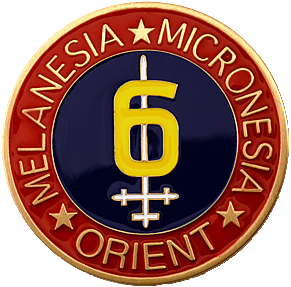
15th Marine Regiment
22nd Marine Regiment
The 22nd Marine Regiment (22nd Marines) is an inactive United States Marine Corps infantry regiment. The regiment was commissioned in 1942 and was placed under the command of the 1st Provisional Marine Brigade, and the 6th Marine Division. It t ...

29th Marine Regiment

Other 6th Marine Division battalions
Others
Infantry Battalions
Marine defense battalions
Marine Defense Battalions were United States Marine Corps battalions charged with coastal and air defense of advanced naval bases during World War II. They maintained large anti-ship guns, anti-aircraft guns, searchlights, and small arms to repe ...

1st Marine Parachute Regiment
The Paramarines (also known as Marine paratroopers) was a short-lived specialized combat unit of the United States Marine Corps, trained to be dropped from planes by parachute. Marine parachute training which began in New Jersey in October 1 ...

''Note: Personnel from this unit were transferred to the
5th Marine Division
The 5th Marine Division was a United States Marine Corps ground combat division which was activated on 11 November 1943 (officially activated on 21 January 1944) at Camp Pendleton, California during World War II. The 5th Division saw its firs ...
.''
1st Marine Raider Regiment
The Marine Raiders are special operations forces originally established by the United States Marine Corps during World War II to conduct amphibious light infantry warfare. " Edson's" Raiders of 1st Marine Raider Battalion and " Carlson's" Rai ...

''Note: In February 1944 the 1st Raider Regiment was disbanded and reorganized as the
4th Marine Regiment
The 4th Marine Regiment is an infantry regiment of the United States Marine Corps. Based at Camp Schwab in Okinawa, Japan, it is part of the 3rd Marine Division of the III Marine Expeditionary Force.
Mission
Close with and destroy the enemy by fi ...
.''
Tank battalions
Amphibian Tractor battalions
Armored Amphibian Tractor battalions
Other battalions
See also
*
Ground combat element
**
List of United States Marine Corps divisions
This is a list of United States Marine Corps divisions.
Active
See also
* United States Marine Corps Judge Advocate Division
* List of United States Marine Corps aircraft wings
* List of United States Marine Corps logistics groups
* List o ...
**
List of United States Marine Corps ground combat element regiments
**
List of vehicles of the United States Marine Corps
This is a list of vehicles and aircraft used by the United States Marine Corps, for combat, support, and motor transport.
Vehicles
The below list contains vehicles confirmed to be in service as of early 2022. This list may not include stored ...
**
List of weapons of the U.S. Marine Corps
This is a list of weapons used by the United States Marine Corps:
Weapons used
The basic infantry weapon of the United States Marine Corps is the M27 Infantry Automatic Rifle. Suppressive fire is provided by the M240B machine gun, at the squad an ...
*
Logistics combat element
**
List of United States Marine Corps logistics groups
This is a list of United States Marine Corps logistics groups:
See also
* List of United States Marine Corps divisions
This is a list of United States Marine Corps divisions.
Active
See also
* United States Marine Corps Judge Advocate D ...
**
List of United States Marine Corps logistics regiments
**
List of United States Marine Corps Combat Logistics Companies
A Combat Logistics Company (CLC) is a logistics unit of the United States Marine Corps that are based at Marine Corps air stations. Formerly known as Combat Service Support Companies, they provide intermediate supply support and intermediate motor ...
*
Aviation Combat Element
**
List of United States Marine Corps aircraft wings
This is a list of United States Marine Corps aircraft wings:
Active
Inactive
See also
* List of United States Marine Corps divisions
* List of United States Marine Corps logistics groups
Citations
{{DEFAULTSORT:List Of United Stat ...
**
List of United States Marine Corps aircraft groups
This is a list of United States Marine Corps Aviation Groups (MAG, MACG, MATSG). Inactive groups are listed by their designation at the time they were decommissioned.
Active Marine Aircraft Groups (MAG)
MAGs consist of a MAG headquarters, a Mar ...
**
List of United States Marine Corps air control groups
**
List of United States Marine Corps aircraft squadrons
This is a list of all of the active squadrons that exist in the United States Marine Corps, sorted by type. Most squadrons have changed names and designations many times over the years, so they are listed by their current designation.
:''To see ...
**
List of United States Marine Corps aviation support units
This is a list of United States Marine Corps aviation support squadrons and other units, sorted by type.
Active
Marine Wing Headquarters Squadrons
The Marine Wing Headquarters Squadron (MWHS) provides administrative and supply support for a Mari ...
References
;Notes
:
;Bibliography
*
;Web
Units of the United States Marine Corps
{{DEFAULTSORT:United States Marine Corps Battalions
*
Battalions
A battalion is a military unit, typically consisting of 300 to 1,200 soldiers commanded by a lieutenant colonel, and subdivided into a number of companies (usually each commanded by a major or a captain). In some countries, battalions are ...
*
Marine Corps Battalions







 The LE battalions will be a force multiplier to the operating forces forward deployed by assisting in an array of missions from law enforcement, route regulation, humanitarian assistance, nonlethal weapons training, and military working dog employment. Marine Corps Bulletin 5400, released in September 2011, called for the reactivation of the 1st, 2nd, 3rd, and 4th Military Police Battalions, now designated as law enforcement battalions, in each Marine Expeditionary Force and Marine Forces Reserve. Three law enforcement battalions were activated in June 2012, with each battalion consisting of a headquarters and service company and two or more law enforcement companies. Each included "500 military police officers 'sic''and dozens of dogs." (Note: As military units, each battalion contains only about 30 to 40 "officers," as the majority of the military police Marines are enlisted members and not officers. "Officers" as in any military organization, command the battalion and its organic companies and platoons and serve as staff officers in the battalion headquarters.)
By 2030 all of the battalions will be disbanded following the re-organisation announcement.
The LE battalions will be a force multiplier to the operating forces forward deployed by assisting in an array of missions from law enforcement, route regulation, humanitarian assistance, nonlethal weapons training, and military working dog employment. Marine Corps Bulletin 5400, released in September 2011, called for the reactivation of the 1st, 2nd, 3rd, and 4th Military Police Battalions, now designated as law enforcement battalions, in each Marine Expeditionary Force and Marine Forces Reserve. Three law enforcement battalions were activated in June 2012, with each battalion consisting of a headquarters and service company and two or more law enforcement companies. Each included "500 military police officers 'sic''and dozens of dogs." (Note: As military units, each battalion contains only about 30 to 40 "officers," as the majority of the military police Marines are enlisted members and not officers. "Officers" as in any military organization, command the battalion and its organic companies and platoons and serve as staff officers in the battalion headquarters.)
By 2030 all of the battalions will be disbanded following the re-organisation announcement.






